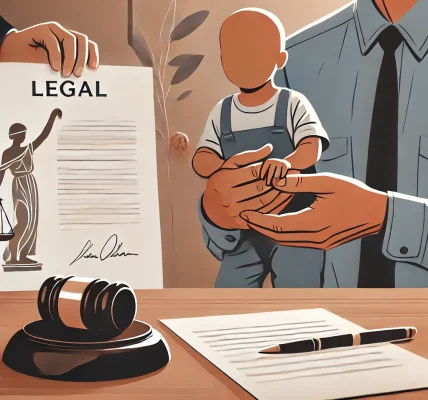Grandparents play a crucial role in a child’s life, offering love, wisdom, and stability. However, legal questions arise when a grandparent wishes to secure visitation or even custody of a grandchild. Family law varies across jurisdictions, but in many cases, courts recognize the rights of grandparents under specific circumstances.
This article will explore when and how grandparents can seek custody or visitation rights, legal considerations, and the best approach to ensure a positive outcome.
Understanding Grandparents’ Rights in Family Law
Grandparents’ rights refer to their legal ability to seek custody or visitation with their grandchildren. While parents typically have the primary authority over their children, courts acknowledge that in some cases, a child’s well-being is best served by allowing grandparents access.
Key Aspects of Grandparents’ Rights
✔ Legal custody: Seeking full or partial custody of a grandchild. ✔ Visitation rights: Gaining legal permission to spend time with a grandchild. ✔ Dependency and neglect cases: When a child’s parents are deemed unfit. ✔ State-specific laws: Each state or country has different regulations regarding grandparents’ rights.
Can Grandparents Seek Custody of Their Grandchild?
Yes, but only under specific conditions. Courts prioritize parental rights, but if parents are unable to care for the child, a grandparent may be able to obtain custody. Situations where courts may consider granting custody to grandparents include:
1. Parental Unfitness
If the parents are unable to provide a stable, safe environment due to reasons such as:
- Substance abuse
- Neglect or abandonment
- Domestic violence
- Mental health issues
- Incarceration
A grandparent may petition the court for custody to ensure the child’s well-being.
2. Death of One or Both Parents
When a child’s parents pass away, courts may consider placing the child with a grandparent instead of foster care or distant relatives.
3. Parental Consent
In some cases, a parent may voluntarily grant custody to a grandparent if they are unable to care for the child due to financial instability, military deployment, or other personal reasons.
4. Existing Caregiving Relationship
If a grandparent has been the child’s primary caregiver for an extended period, they may argue that removing the child from their care would be detrimental to the child’s emotional and physical well-being.
How Can Grandparents Obtain Visitation Rights?
Even if a grandparent is not seeking custody, they may wish to maintain a strong bond with their grandchild through court-ordered visitation. However, securing visitation rights depends on several factors:
1. Best Interests of the Child
Courts prioritize what is in the child’s best interest. They will assess:
- The emotional bond between the grandparent and grandchild.
- The child’s physical and mental well-being.
- Any history of abuse, neglect, or conflict.
2. Parental Objection
If the child’s parents are alive and object to grandparent visitation, courts may hesitate to overrule their decision unless compelling reasons exist.
3. Parental Divorce or Separation
In many jurisdictions, grandparents may seek visitation rights if the child’s parents are going through a divorce, separation, or one parent has passed away.
4. Grandparent as a Stabilizing Influence
If the grandparent has played a consistent role in the child’s upbringing, courts may consider that maintaining the relationship benefits the child’s emotional development.
Legal Steps to Seeking Custody or Visitation
- Consult a Family Law Attorney – Understanding state laws is crucial as they vary widely.
- File a Petition – A formal request must be submitted to the family court.
- Provide Evidence – Demonstrate why custody or visitation is in the best interest of the child.
- Attend Mediation (If Required) – Some courts encourage mediation before litigation.
- Court Hearing – A judge will evaluate evidence and testimonies before making a decision.
Challenges in Grandparents’ Rights Cases
🚫 Parental Rights Supersede Grandparents’ Rights – Courts generally favor parental authority unless clear harm is demonstrated. 🚫 State Laws Differ – Some states have strict regulations making it difficult for grandparents to obtain custody or visitation. 🚫 Burden of Proof – Grandparents must provide strong evidence proving their involvement is essential for the child’s well-being.
Financial and Emotional Considerations
While seeking custody or visitation, grandparents should also consider: ✔ Financial Stability – Custody can come with financial responsibilities, including medical care, education, and daily expenses. ✔ Emotional Readiness – Raising or maintaining a strong relationship with a grandchild can be emotionally demanding. ✔ Legal Costs – Court proceedings can be expensive; mediation or settlement may be cost-effective alternatives.
Which Option Offers the Best Returns?
If you are a grandparent seeking to protect your relationship with your grandchild, consider the following:
For Custody Seekers:
✅ Ensure you have a strong case showing why custody is in the child’s best interest. ✅ Work closely with legal professionals to navigate family law effectively. ✅ Be financially prepared for the responsibilities of full custody.
For Those Seeking Visitation:
✅ Document your relationship with the child (photos, messages, interactions). ✅ Avoid legal conflicts with parents and try mediation first. ✅ Focus on demonstrating a positive influence on the child’s life.
Conclusion
Grandparents’ rights are complex but essential for maintaining meaningful family relationships. While courts typically prioritize parental authority, they may grant custody or visitation to grandparents in cases where it benefits the child. Understanding legal procedures, state laws, and strategic approaches can help grandparents navigate this challenging process.
Key Takeaways:
✔ Grandparents can seek custody if parents are unfit, deceased, or have voluntarily given up care. ✔ Visitation rights depend on parental objections, the child’s best interest, and prior caregiving involvement. ✔ Legal challenges exist, but proper documentation and mediation can improve outcomes. ✔ Seeking legal advice is essential to navigate state-specific regulations effectively.
Disclaimer: This article is for informational purposes only and does not constitute legal advice. Please consult a family law attorney for specific guidance.




